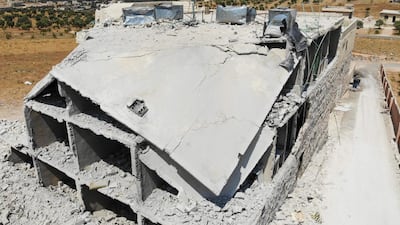War crimes in Syria and other conflict zones show that the Geneva Conventions are no longer deterring governments and armed groups from mass killing, rape and torture, the head of the International Committee of the Red Cross said on Tuesday.
The deaths of civilians during the bombardment of hospitals, ambulances and other non-military sites during a near four-months long government air offensive in northwest Syria's Idlib province has put the issue higher up on the UN Security Council's agenda.
Marking the 70th anniversary of the conventions, however, the ICRC's Peter Maurer said modern warfare was outpacing efforts to stop the same crimes that led countries to sign the international treaties after the Second World War.
“Too often, ICRC sees the impact when international humanitarian law is violated — indiscriminate killing, torture, rape, cities destroyed, psychological trauma inflicted,” said Mr Maurer, the organisation's president, in New York.
"Efforts to ensure respect for the law are inadequate," he said. Urban warfare, unorthodox alliances of armed groups on the battlefield as well as cyber technologies and autonomous weapon systems were making matters worse, Mr Maurer said.
Germany's Foreign Minister Heiko Maas said Syria was the place where the Geneva Conventions and their additional protocols were most openly flouted.
“Day after day, civilians, humanitarian workers and medical personnel are attacked,” he told the council.
“Hospitals and schools are targeted. A hospital supported by the German government and its humanitarian partners in the Syrian town of Kafr Nabl was attacked twice. Let us bring those who attack humanitarian workers and violate the Geneva Conventions to justice.”
Britain has become a frequent critic of the Syrian government's air war on Idlib, accusing President Bashar Al Assad's forces of war crimes in their quest, backed by Russia, to wrest back the province from rebel control.
The ongoing offensive "defies humanity" said Karen Pierce, Britain's ambassador to the UN, also citing the Assad regime for tactics over the eight-year war that include forced starvation of populations as well as arbitrary detention.
“Justice may not come tomorrow, but it will come,” she told the council, welcoming UN Secretary-General Antonio Guterres' decision to set up a board of inquiry to probe the recent attacks on hospitals and schools in Idlib.

